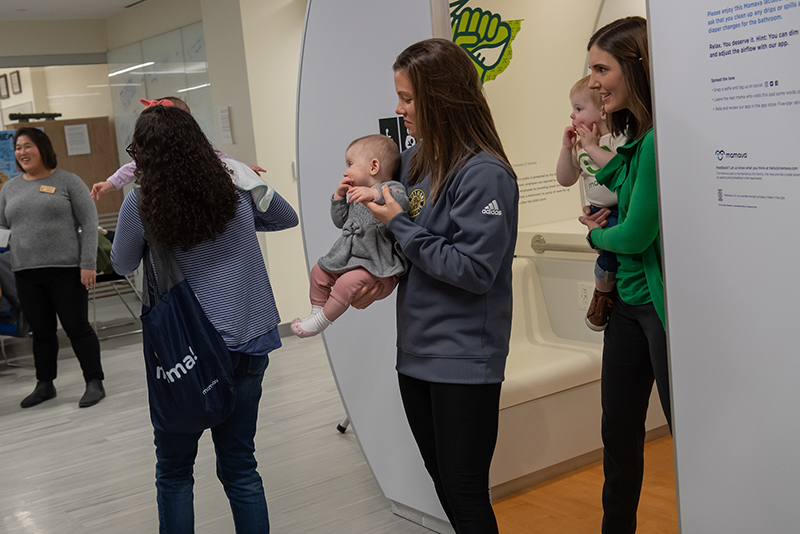The University of Vermont held a ceremony today formally inaugurating a new Mamava lactation pod in UVM’s STEM complex, one of two new pods the university recently added to campus. The other is located in Patrick Gymnasium.
Burlington-based Mamava is the country’s leading provider of lactation suites that enable parents to pump breast milk or breastfeed their infants in private, comfortably and with dignity.
“We’re very pleased to make these new Mamava pods available to nursing parents at the university,” said Wanda Heading-Grant, UVM’s vice president for Human Resources, Diversity and Multi-Cultural Affairs. “The workplace can be a challenging environment for parents who breastfeed. We are committed to doing everything we can do to provide spaces that enable them to care for their infants comfortably and privately.”
“We’re thrilled to see these Mamava pods at UVM,” said Sascha Mayer, co-founder and CEO of Mamava and a UVM alumna. “There are seven UVM alumni on staff at Mamava and UVM was the university that helped ignite our entrepreneurial spirit and passion for social justice. Parents deserve a dignified place to use a breast pump or breastfeed distraction-free—anywhere, anytime. We are proud to see UVM support their breastfeeding community while also supporting Mamava, a company appropriately conceived, birthed, and growing in the Viridis Montis.”
The process that brought the new Mamava pods to campus was a deliberate one.
While the university has had private lactation rooms for years, they were not located evenly on campus, leaving some breastfeeding parents with no nearby facilities.
That fact was brought to the attention of Stephanie Loscalzo, a member of UVM’s Staff Council who works in the dean’s office of the College of Arts and Sciences, by a nursing mother who was having to walk across campus to find a lactation room.
Loscalzo formed a subcommittee of employees to address the issue. As its first order of business, the subcommittee undertook an inventory of existing lactation spaces on campus.
“We identified two areas that were underserved — central campus and the athletic complex,” Loscalzo said.
Loscalzo and several colleagues, including Emily McCarthy in the Affirmative Action and Equal Opportunity Office and Mindy Kear from Larner College of Medicine, developed a proposal to acquire the Mamava pods and received the go-ahead from UVM’s central administration.
“The university couldn’t have been more empathetic and responsive,” Loscalzo said.
As part of its work, the subcommittee also created a liaisons program so breastfeeding parents had a designated person to help find a nearby lactation room or advocate for them, if a new space was needed. Later a website was created to consolidate all information relevant to breast-feeding parents at UVM.
The Mamava suite is a self-contained, mobile pod with comfortable benches, a fold-down table, an electrical outlet for plugging in a breast pump, and a locking door for privacy. Mamava’s Original lactation pod—7’3” high and wide, with a depth of 3’7”—is meant for individual use, but can fit more than one person, as well as mothers with babies and other children in tow. The UVM pods are Mamava’s larger ADA model—twice the size at 50 square feet, and wheelchair accessible.
UVM staff from various departments collaborated to support bringing the Mamava pods to campus, including Larner College of Medicine, HRS/Employee Wellness, Fleming Museum, Women’s Center, AAEO, College of Arts & Sciences, Student Financial Services, Tutoring Center, UVM Extension, Staff Council, College of Engineering and Mathematical Sciences, Physical Plant Department and UVM Athletics.
Source: UVM News

